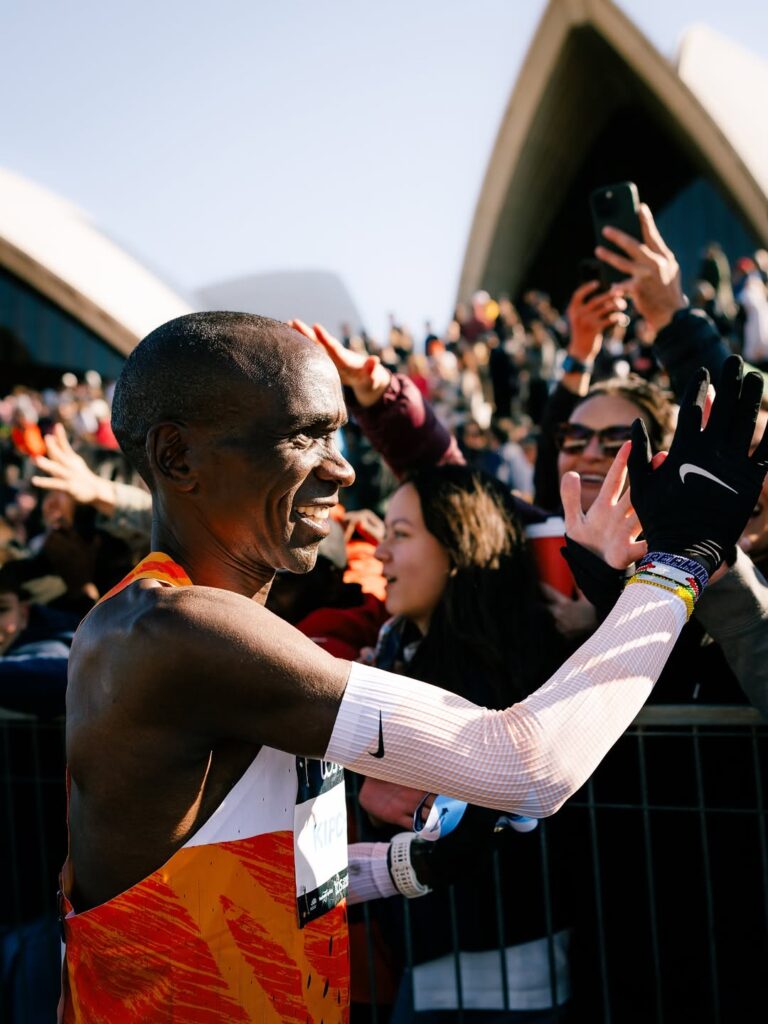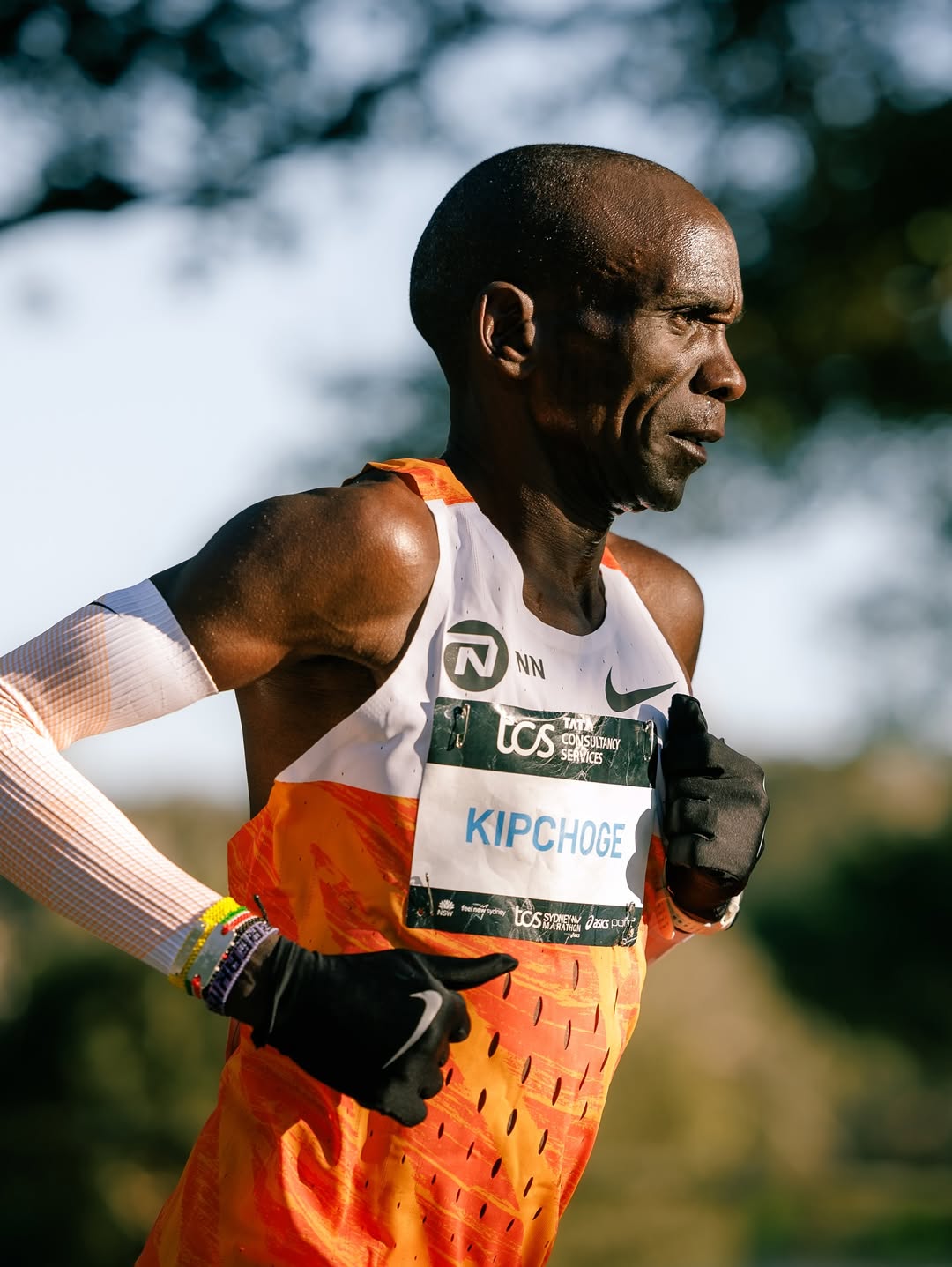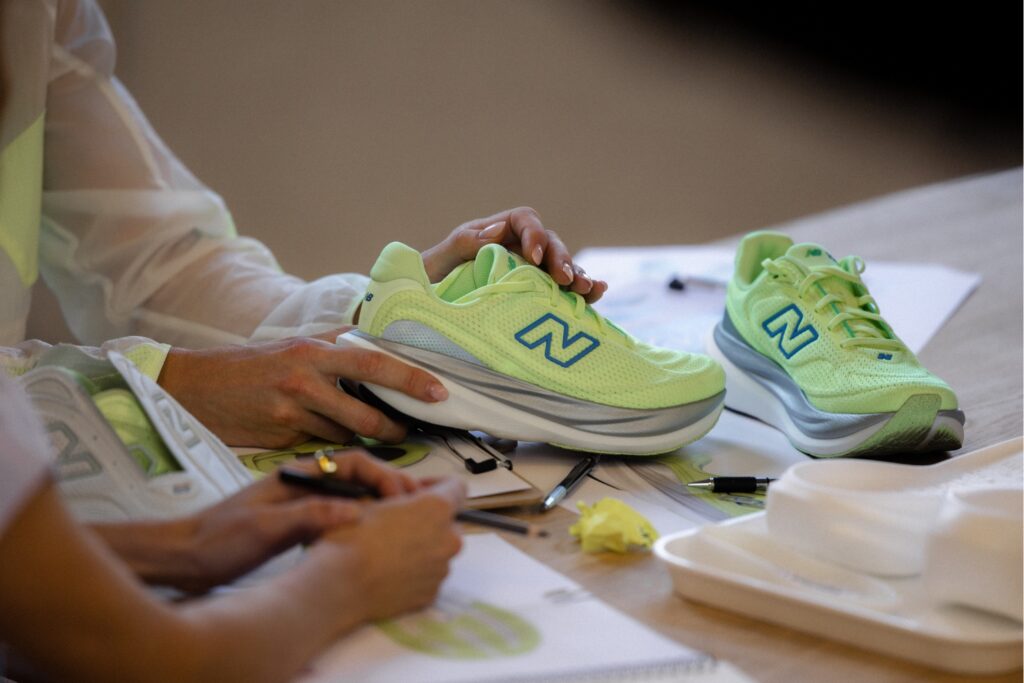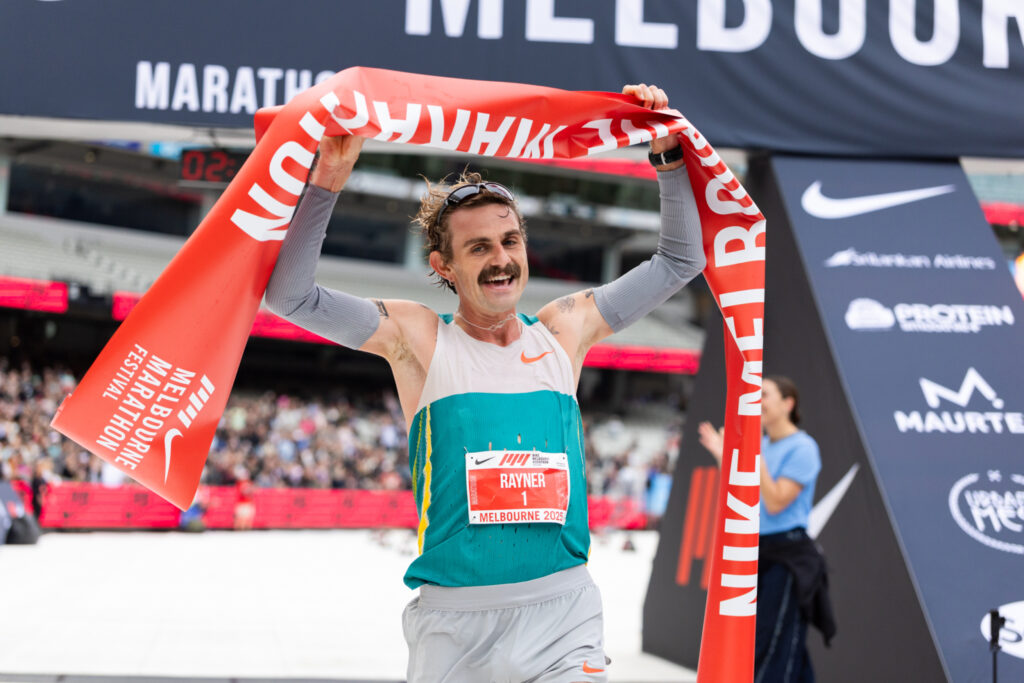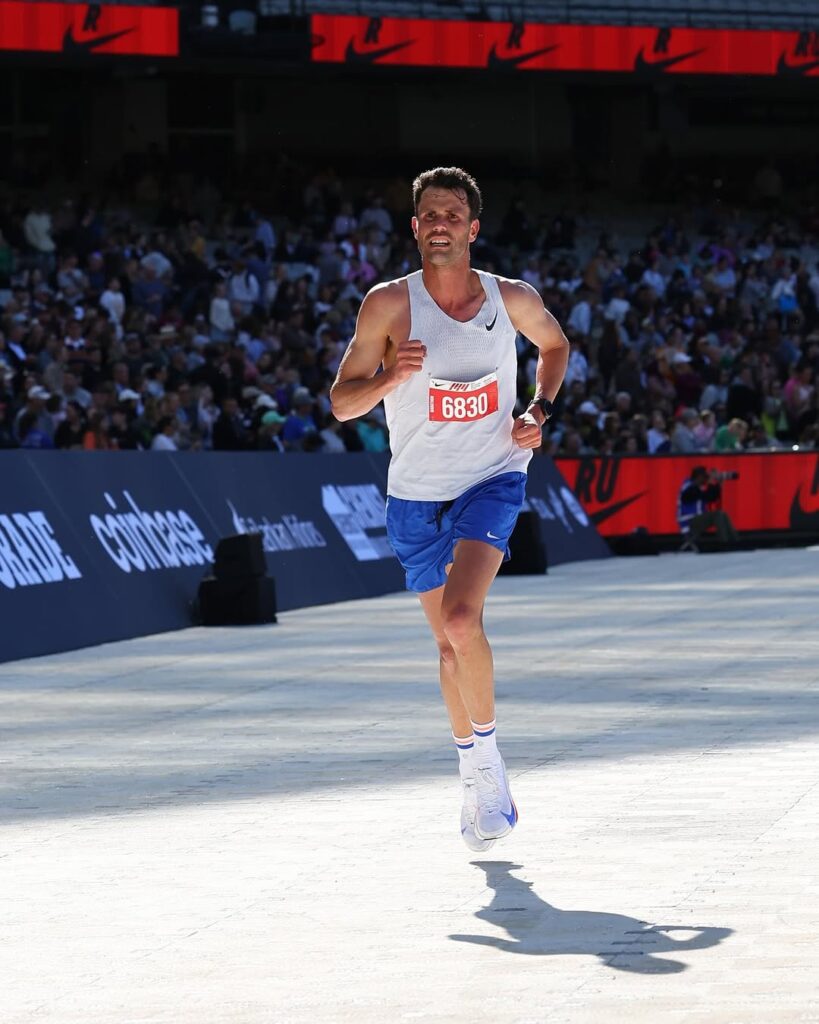“I DON’T BELIEVE in limitations” is what Eliud Kipchoge says matter-of-factly during Nike’s ‘In Conversation with Running Royalty’ event inside the Sydney Opera House’s Yallamundi rooms the day after the 2025 Sydney marathon.
The belief that no human is limited has become Kipchoge’s personal mantra. Looking to history, it’s clear that there is some truth to the claim. Before the 1908 Olympics in St. Louis, there was debate over whether the marathon should even be held. At the time, James Sullivan of the Amateur Athletic Union said that “A 25-mile run is asking too much of human endurance. In sending some 30 men or more into an endurance test as keen and terrible as the marathon run, an awful chance is taken.” Such a stance seems laughable by today’s standards, where thousands complete a marathon every year.
The four-minute mile had similar connotations attached to it, with the prevailing belief being that the sub-four barrier could not be broken. Then, in 1954, Sir Roger Bannister ran a mile in 3:59.4. Today, the world record stands at 3:43.13.
Kipchoge, perhaps better than any living person, understands how it feels to do what was once thought to be impossible. On October 12, 2019, Kipchoge became the first, and so far the only person to run a marathon in less than two hours.
In the year 2000, the marathon world record stood at 2:05.42. Only a meagre three minutes had been shaved off the record in the 40 years prior. Going sub-two was considered theoretically possible, but even the most liberal estimates considered it a long way away. A mathematical study from 2018 published in the Journal of Sports Medicine asserted, with some optimism, that “it is possible that a male athlete can break through the sub-2-hour barrier in the next decade”, and that “most likely, this runner will have an age of ~27 years.” Kipchoge would go sub-two just over a year later, at the age of 34.
Kipchoge has proven that it’s unwise to place arbitrary limitations on human performance. But now that he has reached the age of 40, it is a painful, biological inevitability that his body is simply more limited in what it can achieve compared to six years ago, when he set the marathon world record.
That said, Kipchoge remains one of the world’s best runners. In Sunday’s Sydney marathon, he crossed the line in a time of 2:08.31, finishing in ninth position. There are very few people in the world who can run a marathon in that time. Kipchoge is doing it in his fifth decade. But the fact remains that Kipchoge has nothing left to prove. Having already achieved all there is to achieve, why is he still running?
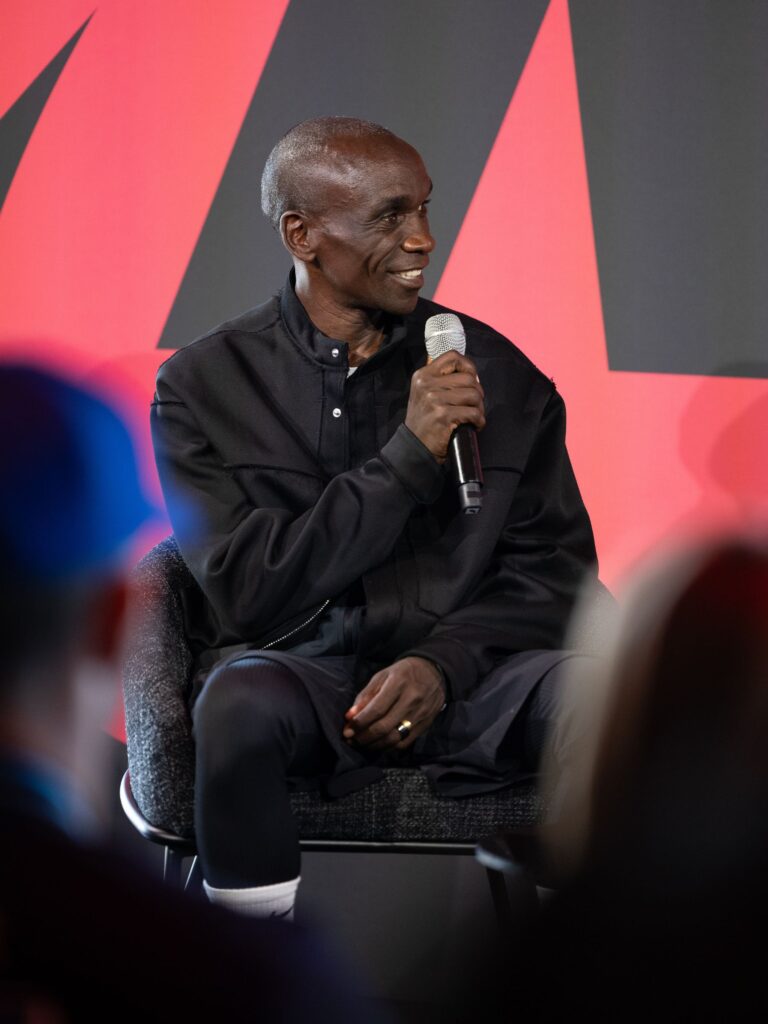
With roughly ten kilometres still to run in the Sydney marathon, Kipchoge dropped out of the leading pack. Until that point, he had looked fairly comfortable in the front peloton, but ultimately found he couldn’t keep pace with the leaders. He dropped off while wearing a weary expression on his face, in stark contrast with his usual beaming mug.
It’s in moments like these that doubt starts to creep in for Kipchoge. Yes, even the GOAT struggles with confidence on occasion. The key, according to Kipchoge, is to not let these moments consume you. “I don’t allow self doubt to take over me,” he tells Men’s Health. “I think that if I can run well today, I can run well tomorrow. If I keep this speed now, I can keep it in five kilometres. I try to block my mind and gain that confidence and move on.”
For Kipchoge, mindset has always been central to his success. “The best advice I’ve been given is treat yourself as the best,” he says. “When I am at the starting line, I tell myself that I have trained more than anyone else there, that I have worked harder than them and that I have done more than them, and that is why I will win.”
Does Kipchoge still train harder than everyone else at age 40? Absolutely. “I don’t believe that getting older should change the way you approach training,” he says. “When I run now, I feel it in my shoulders and my legs more than I did when I was younger, but there is no reason why I should change my training because I am old. Every day is a new day with new challenges, and I can only try to complete the challenges of the day.”
During a training camp, Kipchoge will run more than 100 kilometres per week. He doesn’t go flat-out during training runs. Instead, he rotates between 50 and 80 per cent effort for long runs, focusing on distance rather than speed. A couple times a week he’ll also work on strength and mobility with exercises like planks, glute bridges and single-leg deadlifts. The thousands of kilometres Kipchoge has run throughout his life have chiselled his muscles into the perfect instruments for forward propulsion, so the goal with these sessions isn’t to gain mass, but to prevent injury.
Such an arduous training regime is a considerable time commitment, not to mention hard on your body. So again, we return to the question of why Kipchoge still bothers. The answer, according to the man himself, was clear as soon as he finished the Sydney marathon.
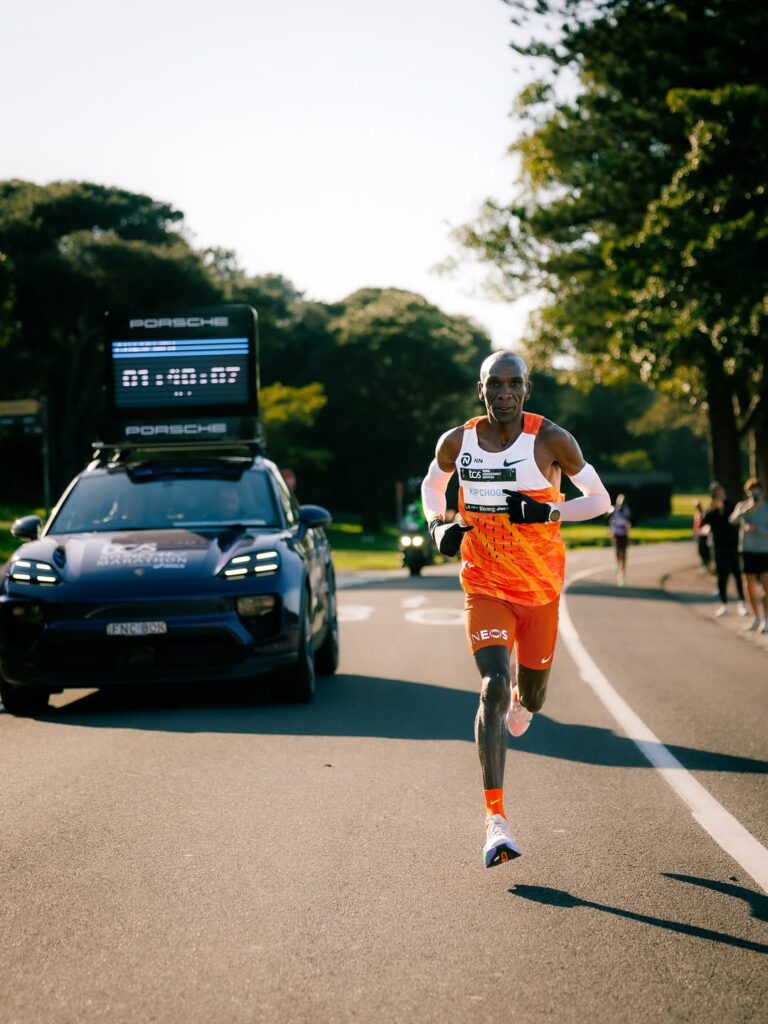
Crossing the finish line in the shadow of the Sydney Opera House, Kipchoge’s pained expression suddenly broke into a smile. He started congratulating those who finished before him before facing the crowd, absorbing their rapturous cheers.
That feeling of support and connection with the running world is why Kipchoge will never stop running. He admits that he does occasionally allow himself to question if it’s time to walk away, but it’s the people that keep him coming back.
“Sometimes I feel like quitting the sport, but my inspiration comes from around the world,” Kipchoge says. “It’s what makes me want to wake up every morning and run and still be hungry to compete, still hungry to train every day, still hungry to go for long runs. It’s the people who I see when I run, who start running with me, that motivate me to keep going.
“Sometimes people approach me and ask, ‘Hey, you are 40, why don’t you quit the sport?’,” Kipchoge continues. “But every time I meet someone like them, I meet three more people who tell me that I inspire them and that I should keep going. That is what inspires me.”
Kipchoge is unlikely to ever top his sub-two marathon, but he doesn’t need to. He won’t stand in the way of progress, either, and believes that someday his record will tumble. He doesn’t place any limitations on his peers.
“I believe small improvements will happen,” Kipchoge says, when asked if he thinks the marathon world record will continue to be lowered. “Every second counts. Even half a second counts. We think in hours, days, weeks, months; but in running, it is every second that counts. I don’t think we will ever reach a conclusion where we say, ‘This is as fast as anyone will ever do it’. Life cannot stop. We will keep finding ways to save one second and we will get faster. With the new science and technology, we cannot conclude on anything at all.”
Kipchoge doesn’t deal in absolutes. He doesn’t believe that humans are born with an indiscriminate cap on what they can physically accomplish. He doesn’t believe that he’ll always be the only person in history to run a marathon in less than two hours. But he is firm on one thing. When we ask him if there will come a time when he no longer wants to do the thing he loves most, Kipchoge doesn’t hesitate: “I will never stop running.”
